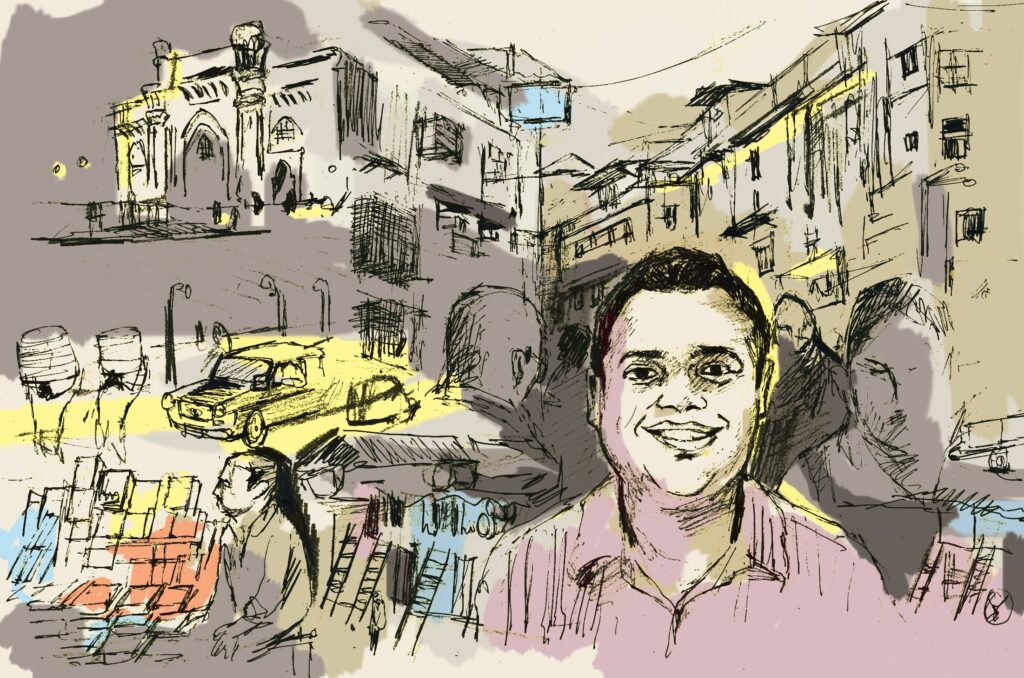A schizophrenic’s guide to Mumbai
Published @ The Bengal Post

Just as when you thought that Vikram Chandra’s Love and Longing in Bombay, Suketu Mehta’s Maximum City and Gregory Roberts’ Shantaram had, between the covers of their voluminous homage to the megapolis, had cracked open the city, comes Gyan Prakash’s Mumbai Fables, one more splendid and unputdownable ode to the city. But does this quartet close Mumbai to the hack-and-the-schlock writer forever? Hope not. Because Mumbai will always be open to multiple interpretations; because in the post-industrial, post-urban, post-Cold War and post-factum modernity of the 21st century, the city is the new god, the new secularity.
Talking of Suketu Mehta, the city which he had made his muse once surprised him no end. Once on his way to the airport and much after his magnum opus was popular enough to be a bestselling photocopy, he was accosted by a canvassing underage boy. The book the boy was trying sell to Mehta was a book called Maximum City by one Suketu Mehta for 500 bucks. After a pause, Mehta held out his hand from his cab, softly picked up the copy and told the boy, in his pidgin Hindi, that he was the author of that very book. After another pause and undaunted by the information, the boy shook his shoulder and said, “In that case pay me Rs 300. That will do.”
This is Mumbai- the city that has mastered the art of selling itself to itself. And no amount of living despicably can rob the city of this supreme self-flattery of its soul, a soul that claims to be made of thousand and one epiphanies. For one, the city never sleeps because it has no home to go. Deep into the night, moon after moon, young men have seen their sideburns turn into salt having cheap whisky and cheaper prawn koliwada at dingy permit rooms and dingier bars. Because they were afraid that on landing at home to sleep they would invariably find out that their wife and wards have taken control of the tiny floor space that’s available after making space for other sundry necessities in their 100 sq feet flat at godforsaken Bhayander.
Was it self-flattery again that took me, on a search for home in downtown Mumbai, to the nether parts of Bandra? Fooled by sophisticated agentspeak and expecting to get a dwelling cabin for less than ten grands, I was scooted to the dodgy, slippery alley adjacent to a skyscraper near Mount Mary church. Dogs and bare torsoed men squatted near the drain. Orpheus-like, I followed the agent, alive, into purgatory, still hopeful that this was just a temporary stop to pick up the keys. Instead, he stopped and keyed open a oval-shaped space they insisted on calling a room (and a home). A wall cut through the middle and on a stilted deck above the bathroom-kitchen combine was a tiny mezzanine where even the smallest of creatures would have to bend. “Your bedroom, Sir, with a skylight.” The instrument of accession to the bedroom was a wooden ladder leaning on the side of the bathroom door! I remember having no choice but to run feverishly up the road back to all-forgiving Mary.
But then on another evening far removed from the one above, I found myself five-star star address, salivating at a bottle of Laphroaig among an assortment of Glenfiddich and Aberfeldy and was soon handed a peg of one on the rocks. The food paired was black and white caviar, smoked salmon, imported tuna and an assortment of seafood sushi. An overwhelmed me, was expecting, even if not some Julian Bream or Leoš Janáček, at least some Chopin with this spread. But who arrived instead? A lightly clad, thin-reed, turquoise-upholstered, blingy-bellied Malaika Arora on a pair of bamboo rods and to the accompaniment of a few bare men and an ‘item-number’, danced to glory. And grown-up men, with the finest whiskies and caviar, held tightly to their chest, watched rapt. I came back drunk and confused and have since made a great virtue of Mumbai’s famed sense of schizophrenia. The city has cabs everywhere but all of them rickety; its buses are spic and span but no one uses them; the Parsi patisseries nestled behind Metro Cinema run out of their best items, dutifully, every day; the trains carrying Mumbai to work are built in factories near labour-challenged Calcutta; ugly apartments that kiss the skies like Jurassic reptiles menacingly lord over the crawling slums, the city that stops for nothing comes out in hordes to feed the homebound crowd when trains close after blasts, the city that loves the sea stays further and further away from it.
But in the last call, a splendid personal journey makes Mumbai totally endearing. one afternoon, having finally discovered a small Goan restaurant at the end of a Colaba lane and having snacked at Café Churchill, I went to pick up a famous Russian novel that I had ordered at the city’s best-known bookshop. To my dismay, I find that what they have only a copy of the play based on that novel and not the novel itself. Severely disappointed, I decided to walk back to home near Liberty cinema. Passing by the old bookshops at Fountain I was causally eyeing the books and looked and then looked again. My heart stopped. There it was. There! Just an hour ago the bookshop had got the wrong book after much labour. And here, on the streets, causally lying between management books and glossy calendars was Mikhail Bulgakov’s The Master and Margarita.
That night I read about the Devil who had stormed Moscow in the 1920s. And I wondered about the devil of a smartass that Bombay was, even if it was silently flattering itself outside the window, on the night streets, where thousands were still looking for a place to sleep!
Illustration of the author by a former colleague.
comments for this post are closed